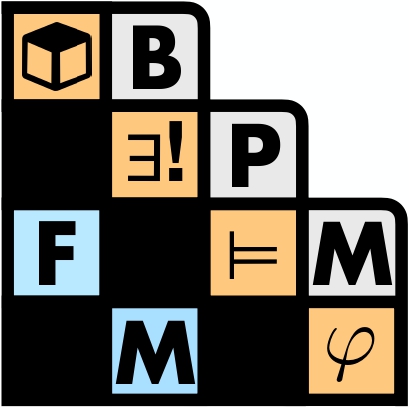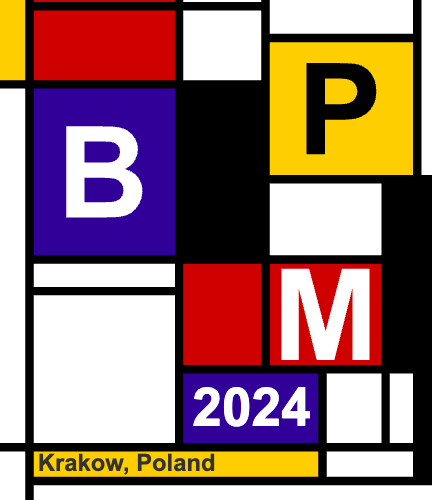

S econd International Workshop on Formal Methods for Business Process Management


Business Process Management (BPM) is the research field that investigates methods and techniques for describing, managing and improving the organization, control and interplay of activities, data and resources employed by companies and organizations to cooperatively achieve the desired outcome. Processes thus take into account not only the complex operational structure of the organization but also consider actors and possible objects and artifacts that these actors deal with during their work. Therefore, it becomes crucial that processes are correctly specified (preferably using a language with a mathematically defined meaning) and that their outcomes fulfill the intended requirements of the process and reach the planned goals. Due to design mistakes, process executions may result in unwanted behaviors that violate (some of) the predetermined objectives.
Formal methods are a set of techniques, methods and tools that exploit rigorous mathematical notions for the specification, development, and analysis of complex systems. The main idea behind the use of formal methods is motivated by the expectation that performing appropriate mathematical analysis can contribute to the reliability, trustworthiness and robustness of the design of a system. Formal methods techniques are based on mathematics, formal logic, and, in general, on various instruments supplied by theoretical computer science and its foundations. These techniques are usually employed to formally verify hardware or software systems against some property of interest, to assess whether these systems satisfy it or not. In the field of BPM, formal methods can provide a repertoire consisting of both theoretical and practical toolkits to guarantee the correctness of processes and assess their capability to reach predetermined Key Performance Indicators.
The Second International Workshop on Formal Methods for Business Process Management (FM-BPM 2024) is a BPM 2024 international workshop and provides a platform for presenting and discussing in detail the application in the BPM area of key formal methods devices and best practices for system abstraction construction, technical underpinnings of analytic algorithms, formal demonstrations of correctness, guarantees for formal techniques, but also practicality of the proposed mathematical formalisms and possible drawbacks with the adoption of formal methods in practice.
Providing rigorous specification and analytic techniques for process-aware information systems is one of the main tasks to address in Business Process Management. For this purpose, in the last two decades well-established approaches from Formal Methods have been successfully developed and adopted so as to provide solid foundations and concrete tools for the automated analysis and testing of complex processes.
FM-BPM welcomes submissions that use Formal Methods to specify, model and analyze business processes and process-aware information systems. The aim of this workshop is to bring together researchers and practitioners who are interested in the application of formal methods to improve the quality of information systems, and specifically those that rely on BPM concepts and technologies. FMBPM strives at promoting research and development of formal methods and tools in all areas related to BPM: industrial applications, theoretical frameworks, formal modeling, algorithms and methodologies, tooling, experience reports including teaching and industrial cases.
In addition, the workshop will provide a platform for discussions and the exchange of innovative ideas, thus we also highly encourage submissions on work in progress.
All papers should be in English and describe original work that has not been published or submitted elsewhere. All submissions will be reviewed by members of the Program Committee. Only papers in English will be considered. Submitted papers must present original research contributions not concurrently submitted elsewhere. Authors are requested to prepare submissions according to the LNBIP format specified by Springer (https://www.springer.com/computer/lncs?SGWID=0-164-6-791344-0). The title page must contain a short abstract and a list of keywords, preferably using the list of topics given above. Papers must be submitted electronically via EasyChair: enter the main conference installation (https://easychair.org/conferences/?conf=bpm2024) and select “Workshop on Formal Methods for BPM” as the submission track.
We are interested in research, work-in-progress, tools and case-study papers, either in a long (not exceeding 12 pages, including references) or a short (from 5 to 6 pages, including references) format.
This workshop edition will also feature a series of short, “spotlight” tutorials, providing an in-depth account of the topics of interest mentioned below. Tutorial proposals must include:
Topics of interest include (but are not limited to) the following.
Modeling and related aspects. This topic covers techniques and languages supporting modeling of complex, process-aware information systems. We are interested in particular in:
Verification, validation and other analytic techniques. This topic covers foundational analytic techniques devised for formal models, including those mentioned above. The following themes help in understanding the potential submission topics:
Tools. We invite those who are currently developing tools or having at hand already running prototypes to reflect on related topics, that may touch upon the following themes:
Applications. We highly solicit the scientific community to share their experience and ideas of how formal methods are or should be applied in BPM.
Case studies and experience reports (teaching, industrial use cases, etc).
All deadlines are set to 23:59 Anywhere on Earth (UTC - 12) .